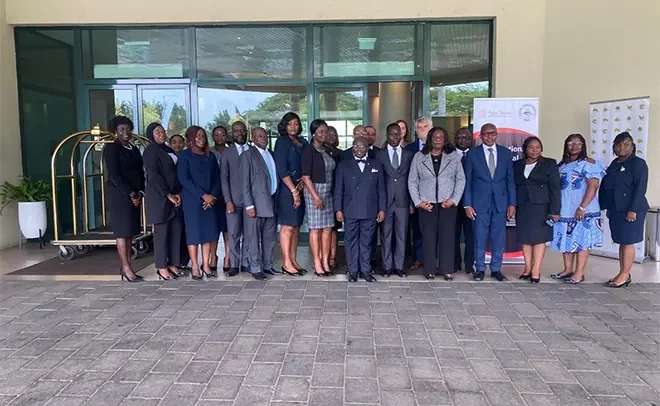Participants in a group photo
A group of selected Judges and Magistrate are receiving a two-day training in Accra on international cooperation in the administration of cross border legal issues.
The training which is organised by the Scuola Superiore Sant’Anna of Pisa in collaboration with the Ministry of Justice of Ghana and the Judicial Training Institute of the Judicial Service of Ghana, and funded by the Italian Ministry of Foreign Affairs and International Cooperation
The initiative underscores the need to build judicial capacity in international cooperation mechanisms and seeks to enhance judicial competence in navigating the landscape of international judicial cooperation, aligning Ghanaian judicial practice with global standards and legal frameworks.
The training will focus on the concept and importance of international judicial cooperation, key United Nations conventions on transnational crime and corruption, regional cooperation models, Mutual Legal Assistance and extradition as well as challenges and the role of the International Criminal Court.
The Director of the Judicial Training Institute, Justice Issifu Omoro Tanko Amadu in a speech read for him by Justice Kweku Tawiah Ackaah-Boafo, a Justice of the Court of Appeal, said the training stands as a powerful and necessary response to these emerging realities.
He indicated that in a world increasingly shaped by transnational movement of people, ideas, capital, and crime, the role of the judiciary is more globally interconnected than ever before.
“From cybercrime and terrorism to corruption and human trafficking, the threats we face are no longer constrained by national boundaries. As a judiciary, we must therefore evolve, not only in our knowledge, but also in our orientation, collaboration, and strategic response,” he stated.
Justice Tanko also indicate that the programme offers the participants a moment of reflection – an opportunity to critically assess how the Ghanaian judiciary can align itself more effectively with global legal standards and systems.
He noted that two critical sessions will be led by members of Ghana’s Bench, bringing local insights into global conversations.
The first session, “Regional Legal Cooperation: Lessons from Europe and Implications for Ghana,” invites participants to draw inspiration from European models as it considers avenues for innovation within ECOWAS and the African Union.
The second session, “Applying International Judicial Cooperation in the Ghanaian Context: Practical Insights on MLA, Extradition, and Legal Obstacles,” grounds international principles in the practical realities of our courts.
“This training is not merely about building capacity. It reinforces the core principle of judicial responsibility-the duty to deliver justice that is fair, timely, and responsive to the needs of a changing world. That duty does not end at our borders; it extends to the global quest for justice, accountability, and the rule of law,” he added.
A representative of Scuola Superiore Sant’Anna, Dr. Mira Benucci noted that the complexities of modern legal systems require stakeholder to master international legal frameworks and cooperation mechanisms.
She encouraged participants to actively participate in the training and exchange ideas and experiences, indicating that “this collaboration approach will enrich your understanding and strengthen your ability to meet the challenges of international judicial cooperation.”
She was hopeful that the training marks the beginning of long-term partnership between Ghana and Italy, “because together we can build a stronger and more interconnected legal community that upholds justice, the rule of law and human rights.”
BY Gibril Abdul Razak


